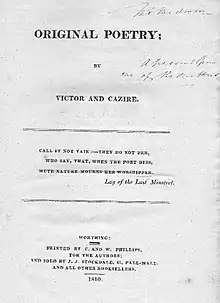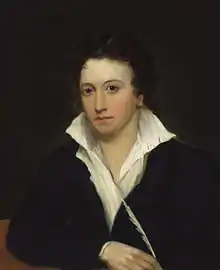Original Poetry by Victor and Cazire
Original Poetry by Victor and Cazire was a poetry collection written by Percy Bysshe Shelley and his sister Elizabeth which was printed by Charles and William Phillips in Worthing and published by John Joseph Stockdale in September 1810. The work was Shelley's first published volume of poetry. Shelley wrote the poems in collaboration with his sister Elizabeth.[1] The poems were written before Shelley entered the University of Oxford.


The volume consisted of sixteen poems and a fragment of a poem. Shelley wrote eleven of the poems while Elizabeth wrote five. Shelley contributed seven lyrical poems, four Gothic poems, and the political poem "The Irishman's Song". Elizabeth wrote three lyrical poems and two verse epistles. The collection included the early poems "Revenge", "Ghasta, Or, The Avenging Demon!!!", "Song: Sorrow", and "Song: Despair". The epigraph was from the "Lay of the Last Minstrel" by Sir Walter Scott: "Call it not vain:— they do not err, Who say, that, when the poet dies, Mute Nature mourns her worshipper."
Controversy surrounded the work, however, because one of the poems included, "Saint Edmond's Eve", originally appeared in the anonymously published Tales of Terror (1801), attributed to Matthew Gregory Lewis.[2] Shelley told Stockdale that his sister Elizabeth had included the Lewis poem. Shelley apologised and informed Stockdale to suppress the volume.[3] Fourteen hundred and eighty copies had been printed and one hundred copies had been circulated.[4] Fearing a plagiarism lawsuit, Stockdale withdrew the work from publication. Copies of the work became extremely rare and it lapsed into obscurity. Four original copies are known to exist.[5][6][7]
In 1859, Richard Garnett was able to substantiate that the volume had been published but was unable to locate an extant copy. The collection was reprinted and revived in 1898 by John Lane in an edition edited by Richard Garnett after a copy of the volume had been found.
Contents
- Letter ("Here I sit with my paper, my pen and my ink")
- Letter: To Miss—From Miss –
- Song ("Cold, cold is the blast when December is howling")
- Song ("Come ---! Sweet is the hour")
- Song: Despair
- Song: Sorrow
- Song: Hope
- Song: Translated From the Italian
- Song: Translated From the German
- The Irishman's Song
- Song ("Fierce roars the midnight storm")
- Song: To – ("Ah! sweet is the moonbeam that sleeps on yon fountain")
- Song: To – ("Stern, stern is the voice of fate's fearful command")
- Saint Edmond's Eve
- Revenge
- Ghasta Or, The Avenging Demon!!!
- Fragment, Or The Triumph of Conscience
Critical reception
The volume was advertised in the Morning Chronicle of 18 September, the Morning Post of 19 September, and The Times of 12 October 1810. Reviews appeared in Literary Panorama, The Anti-Jacobin Review, The British Critic, and The Poetical Register. The reviews, which primarily focused on Elizabeth's poems, were negative and highly critical. Literary Panorama dismissed the poems as examples of "nonsensical rhyme". The British Critic review described the volume as "filled up by songs of sentimental nonsense, and very absurd tales of horror." The Poetical Register called the poems "downright scribble" and a "waste of paper", dismissing "all this sort of trash".[8]
In 2015, David Duff wrote that Original Poetry represents "a vital stage in Shelley's literary development, reflecting a fascinating but under-explored phase in the broader culture of Romanticism."[9] The influence and impact of the work endured: "But the literary experiments of 1810 --- an adventure in writing and book-making involving every kind of transgression, textual, political, and legal --- had a formative effect on his work, the traces of which he could never fully erase."[10]
Influence
Original Poetry by Victor and Cazire influenced Frankenstein; or, The Modern Prometheus (1818). In her biography of Mary Shelley, Anne Kostelanetz Mellor noted the influence of the work on the latter novel:
"As William Veeder has most recently reminded us, several dimensions of Victor Frankenstein are modelled directly on Percy Shelley. (6) Victor was Percy Shelley's pen-name for his first publication, Original Poetry; by Victor and Cazire (1810). Victor Frankenstein's family resembles Percy Shelley's: in both, the father is married to a woman young enough to be his daughter; in both the oldest son has a favorite sister (adopted sister, or cousin, in Frankenstein's case) named Elizabeth. Frankenstein's education is based on Percy Shelley's: both were avid students of Albertus Magnus, Paracelsus, Pliny, and Buffon; both were fascinated by alchemy and chemistry; both were excellent linguists, acquiring fluency in Latin, Greek, German, French, English, and Italian. (7)"[11]
The theme of unremitting vengeance is also common to both works. "Revenge" and "Ghasta, Or, The Avenging Demon!!!" rely on the theme of revenge. The Being similarly seeks revenge against Victor Frankenstein. John V. Murphy noted in The Dark Angel: Gothic Elements in Shelley's Works that the revenge motif was a major theme of Shelley's writings: "The idea of an avenging demon is central in Shelley's poetry and, in diverse form, will appear in almost all of the major works."[12] Revenge is the major theme of Zastrozzi (1810), Posthumous Fragments of Margaret Nicholson (1810), and The Cenci (1819).
The language of the two works is also similar. In the poem "Revenge", line 20, the narrator exclaims: "Alone will I glut its all conquering maw." In Frankenstein, the Being expresses a similar sentiment: "I will glut the maw of death."
See also
Notes
- Dexter 2010
- Dowden 1884
- Stockdale 1826
- Garnett 1860
- Denlinger, Elizabeth. "A Black Tulip Comes to the Pforzheimer Collection". Pforzheimer Collection of Shelley and His Circle, Stephen A. Schwarzman Building, April 18, 2014.
- Denlinger, Elizabeth. "A Black Tulip Comes to the Pforzheimer Collection". Part 2. Pforzheimer Collection of Shelley and His Circle, Stephen A. Schwarzman Building, April 18, 2014.
- "NYPL acquires rare Original Poetry by Victor and Cazire, P.B. Shelley’s first book of verse." Keats-Shelley of Association America.
- Shelley 2000, p. 160
- Duff, David. "Harps, Heroes and Yelling Vampires: The 1810 Poetry Collections", in The Neglected Shelley, edited by Alan A. Weinberg and Timothy Webb, Surrey, UK: Ashgate, 2015, p. 75.
- Duff 2015, p. 76
- Mellor 1988, pp. 72–73
- Murphy 1975, p. 42
References
- Dexter, Gary (16 May 2010). "Title Deed: How the Book Got its Name". Telegraph.co.uk. Retrieved 25 September 2010.
- Dowden, Edward (1884). "Some Early Writings of Shelley". The Contemporary Review (46): 383–396. OCLC 35170347.
- Dowden, Edward (1886). The Life of Percy Bysshe Shelley. London: Kegan Paul, Trench, and Co.
- Garnett, Richard (2 June 1860). "Shelley in Pall Mall". Macmillan's Magazine. 2: 100–110.
- MacCarthy, D. F. (28 February 1877). "Shelly's "Victor and Cazire"". The Athenaeum, Part 1. J. Lection. p. 288.
- Mellor, Anne Kostelanetz (1988). Mary Shelley: Her Life, Her Fiction, Her Monsters. Methuen. p. 72. ISBN 978-0-415-02591-1. OCLC 16950424.
- Murphy, John V. (1975). The Dark Angel: Gothic Elements in Shelley's Works. Lewisburg PA: Bucknell University Press. ISBN 0-8387-1407-2. OCLC 914548.
- Rieger, James. Edited, with variant readings, an Introduction and Notes, by. (1974). Frankenstein or The Modern Prometheus (1818 Text). Indianapolis and New York: The Bobbs-Merrill Company, Inc. ISBN 0-672-51457-5.
{{cite book}}:|first=has generic name (help)CS1 maint: multiple names: authors list (link) - Reiman, Donald H. (August 1997). Neil Fraistat (ed.). "Shelley Comes of Age: His Early Poems As an Editorial Experience". Early Shelley: Vulgarisms, Politics, and Fractals. ISSN 1528-8129. Retrieved 25 September 2010.
- Sandy, Mark (20 September 2002). "Original Poetry by Victor and Cazire". The Literary Encyclopedia. Retrieved 25 September 2010.
- Shelley, Percy Bysshe (1892). Woodberry, George Edward (ed.). The complete poetical works of Percy Bysshe Shelley. The Riverside Press.. Also see:
- Shelley, Percy Bysshe (1901). Woodberry, George Edward (ed.). The Complete Poetical Works of Percy Bysshe Shelley. The Cambridge Edition of the Poets. Boston: Houghton Mifflin. ISBN 1-58734-058-5. OCLC 48506449. Retrieved 4 October 2010.. The text of this edition is that of the Centenary edition of Shelley's Poetical works, 1892, but differs from it by the omission of variant readings and emendations except in cases where the text is acknowledged to be corrupt or of doubtful authority.
- Shelley, Percy (2000). The Complete Poetry of Percy Bysshe Shelley. Vol. 2. Donald H. Reiman, Neil Fraistat (eds.). Baltimore MD: Johns Hopkins University Press. ISBN 0-8018-6119-5. OCLC 41096094.
- Stockdale, John Joseph. Stockdale's Budget, 13 December 1826.
- Veeder, William. "The Negative Oedipus: Father, Frankenstein, and the Shelleys." Critical Inquiry, 12.2 (1986): 365–90.
- Woudhuysen, H. R. (12 July 2006). "Shelley's Fantastic Prank". Times Literary Supplement. Retrieved 4 October 2010.
Further reading
- Grande, James (16 November 2008). "The Original Frankenstein, By Mary Shelley with Percy Shelley ed Charles E Robinson. To what extent did Percy Bysshe Shelley work on 'Frankenstein'? A new analysis reveals all". The Independent. Retrieved 19 October 2010.
- Shelley, Mary, with Percy Shelley. The Original Frankenstein. Edited with an Introduction by Charles E. Robinson. NY: Random House Vintage Classics, 2008. ISBN 978-0-307-47442-1
